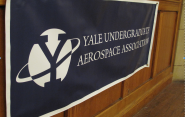At Aeronautica, YUAA Continues Its Rocketing Ascent

With four new cutting-edge projects, a commendation from the White House, and community outreach programs, the Yale Undergraduate Aerospace Association continues to rocket skyward.
 That was evident at the student organization's annual Aeronautica last week. The event highlights the research of the organization and talks about future goals, with booths set up to showcase current projects. Former YUAA co-presidents Genevieve Fowler and Bolun Liu gave the keynote address.
That was evident at the student organization's annual Aeronautica last week. The event highlights the research of the organization and talks about future goals, with booths set up to showcase current projects. Former YUAA co-presidents Genevieve Fowler and Bolun Liu gave the keynote address.
"We work to grow and positively influence Yale Engineering and promote it to the University's future students and the aerospace industry," Fowler told the audience at Sudler Hall. Fowler told of the group's recent accomplishments – including building its first multistage rocket and a radio telescope.
Liu presented a summation of current YUAA projects. These include the group's first CubeSat, a small satellite that will go into lower orbit. A multi-year project, it's set for completion in 2017, and will be designed to take high-resolution photos of Earth from space – maybe even some of Yale.  It was the CubeSat and another project, the building of an optical telescope, that won recognition at the 2nd annual White House Astronomy Night in October. The team building the computer-controlled optical telescope, has so far created a prototype with a six-inch mirror. The final telescope will be about four times bigger, and will feature a high-resolution camera to capture images of deep space. Involved in both projects, YUAA member Lauren Chambers represented the group in person at the Washington D.C. event.
It was the CubeSat and another project, the building of an optical telescope, that won recognition at the 2nd annual White House Astronomy Night in October. The team building the computer-controlled optical telescope, has so far created a prototype with a six-inch mirror. The final telescope will be about four times bigger, and will feature a high-resolution camera to capture images of deep space. Involved in both projects, YUAA member Lauren Chambers represented the group in person at the Washington D.C. event.
A third team is designing a high-performance unmanned aerial vehicle (UAV) a blended wing design. The UAV will collect data while in flight on it's own performance, which the team which will be used in comparisons to standard aircraft.
And per YUAA tradition, the club's rocket-building team will return to the Intercollegiate Rocket Engineering Competition (IREC) this year in Utah. This time, though, it will arrive with its first biology-related project - a rocket that collects air samples during its flight. Those samples will be analyzed for microbes and studied for how organisms grow in the particular conditions of the atmosphere. That event takes place in June – more YUAA updates then!

